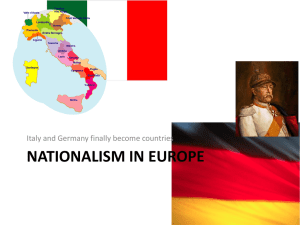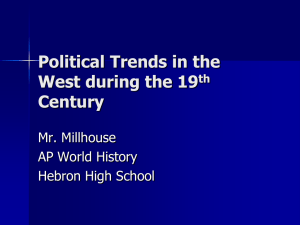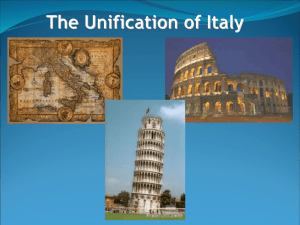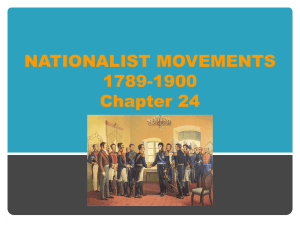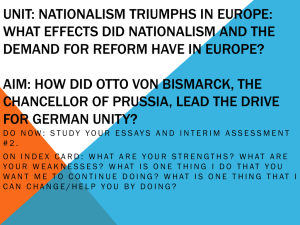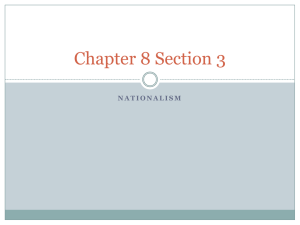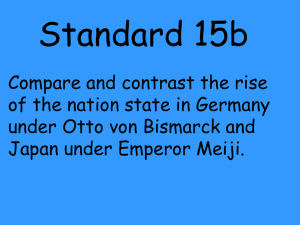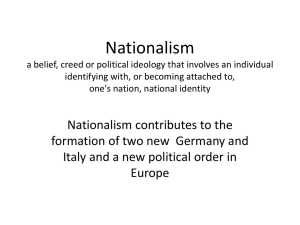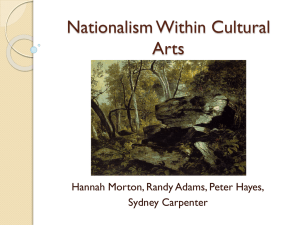Nationalism PPT
advertisement
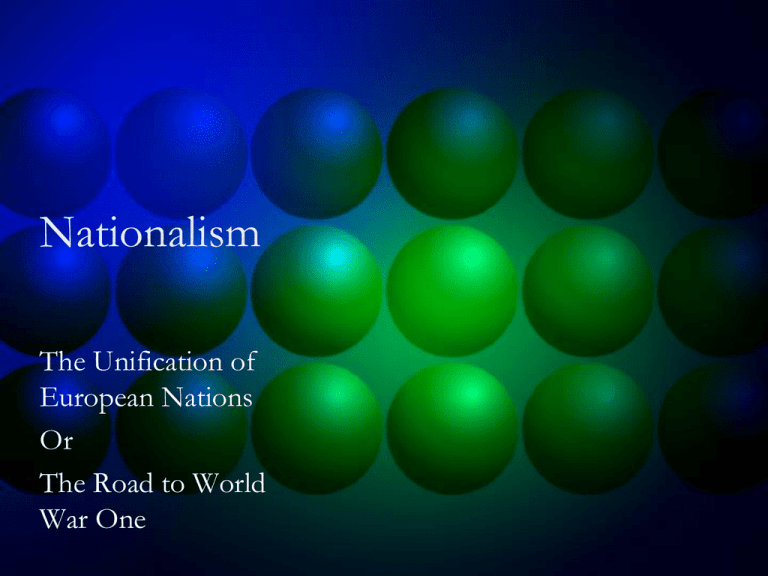
Nationalism The Unification of European Nations Or The Road to World War One Nationalism • Nationalism is defined as pride in one’s country – Strong feelings for one’s country. – People who share a common language, history heritage. – Nationalism causes people to join together Nationalism • 6 bonds that unify a people – common religion – common language – common ethnicity or ancestry – common history – common land – common culture Nationalism • Good – Can work to bring people together. – Give people a common goal. – Pride or loyalty to one’s country. • Bad – Can pull countries apart. – Can cause revolts and wars within the country. – Extreme nationalism can cause world wars because one country feels it is better then another. Nationalism • Nation-state – When the nation has it’s own independent government. Nationalism • Nationalism can be like a bomb and split nations apart – Russia – Ottoman Empire – Austro-Hungarian • These nations/empires controlled vast numbers of different ethnic groups who wanted self government. Nationalism • Nationalism can be like a magnet and bring people together to create nationstates. • Places like Italy and Germany Italy and Nationalism • After the fall of the Roman Empire Italy had been a nation of small states. • Napoleon united Italy into the Kingdom of Italy. • The Congress of Vienna redivided Italy and placed Italy under the rule of Austria. • Italy continued to remain a country of small feudal states Italian Unification • In 1849 the King of Sardinia Victor Emmanuel II and Count Camillo Cavour began to work for Italian unification The Three Leaders of Italy • Count Camillo Cavour – Used alliances with Prussia and France to drive out the Austrians. Italian Unification • Cavour used the rivalry between Austria and France to start a war between both countries • Cavour sided Italy with France and together Italy and France drove the Austrians out of northern Italy by 1859 • Northern Italy was turned over to the Italians The Three Leaders of Italy • Giuseppe Mazzini – Formed the Young Italy Movement in 1831. – Was exiled for his views. – His writing and speeches inspired other nationalist. The Three Leaders of Italy • Giuseppe Garibaldi – Lead forces (Red Shirts) which helped control the north and south of Italy. Italian Unification • In the south Garibaldi started a revolutionary movement to drive the Spanish out of Italy • Garibaldi’s followers known as Red Shirts began attacking the Spanish in Sicily • In 1860 the Red Shirts and Garibaldi had driven the Spanish out of Italy • Finally in 1870 the French withdrew from Italy leaving it a newly unified country Italian Unification • By 1861 most of Italy was unified • Victory Emmanuel II became king of the newly unified Italy German Nationalism Germany and Nationalism • Most Germans lived in small states to which they felt loyalty. • The German region had not been unified since the decline of Charlemagne’s Holy Roman Empire • Nationalist called for a unified Germany. Germany and Nationalism • The Rise of Prussia – Prussia establishes itself as the strongest of the German states. – Bismarck is appointed Chancellor of Prussia – Prussia wanted to unify the German regions into a powerful nation-state to compete against other European nations Germany and Nationalism • Otto von Bismarck – Strong political leader – Did not believe in nationalism but saw unification as a way to make the King of Prussia the King of Germany. Germany and Nationalism • Realpolitik – Bismarck’s idea of politics. – Means “the politics of reality” – Tough power politics with no room for ideals – No friends, don’t trust anyone. Germany and Nationalism • Blood and Iron – Bismarck believed that the only way to unify Germany was through “blood and iron” or war. – In 7 years Prussia fought 3 wars Franco-Prussian War • Franco-Prussian War 1870 • Used nationalism and hatred against France and Napoleon to invade France. • Bismarck and the Prussian formed an alliance with the Catholic states along the French boarder to stop French aggression • In 1870 Bismarck provokes a war with France and France declares war on Prussia • The Catholic states now become unified under Prussia in a effort to fight the war • By 1871 the Prussian win the war • Prussia gains land from France. • Germany is unified Germany and Nationalism • In 1871 the German states unite under the Prussian king William I. • William calls himself Kaiser which means emperor. Results of German Nationalism • Germany quickly industrialized and became a world power • Germany quickly developed a strong army and navy • Germany further began to colonize in Africa and Asia • By 1888 Bismarck was out favor with the socialist • In 1890 William II dismissed Bismarck • By 1914 Germany felt it was strong enough to handle any European power. Zionism • Anti-Semitism – Hatred of the Jews • In 73 CE the Jews had be exiled from their homeland in Palestine/Israel by the Romans. • This was called the Diaspora. • Jews had to find other places to lived and many moved into Europe • The Jews had no homeland or country to call their own Zionism • Some countries in Eastern Europe began to expel and in some cases even murder their Jewish populations. • As Anti-Semitism grew Jews knew they needed to find their own homeland Zionism • Jews began buying property in Palestine from Arab landholders • They organized into farming Communities • In 1896 a Jewish Journalist Theodor Herzl witnessed the horrors of AntiSemitism in France and called for Jews to from their own Zionism • Herzl’s movement was called Zionism • It was devoted to creating an independent nation state in Palestine • In 1947 the nation state of Israel was created
